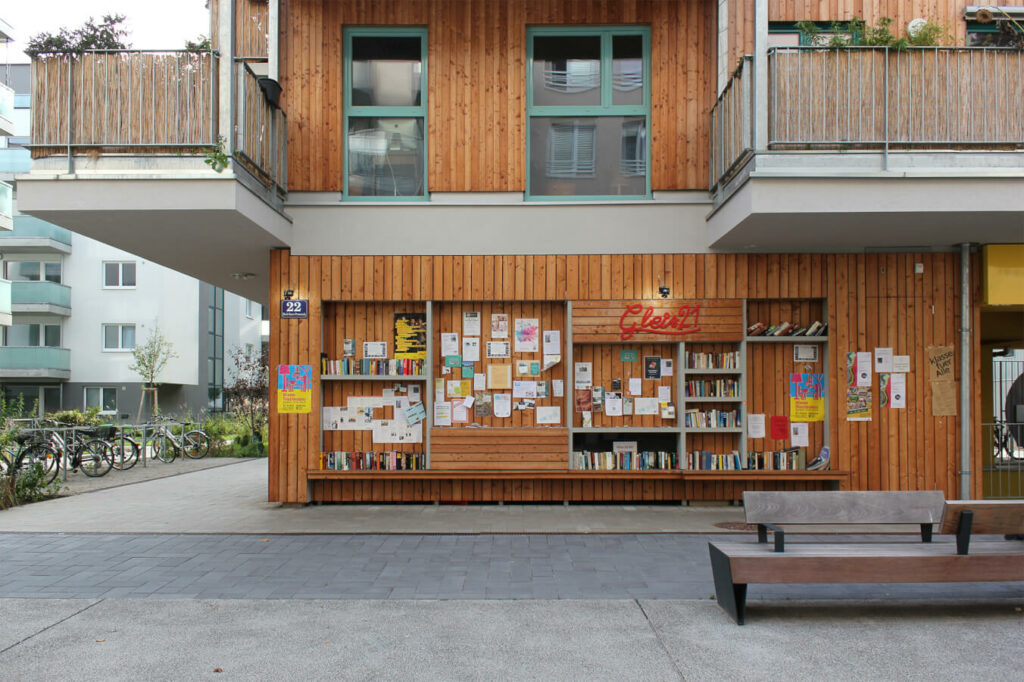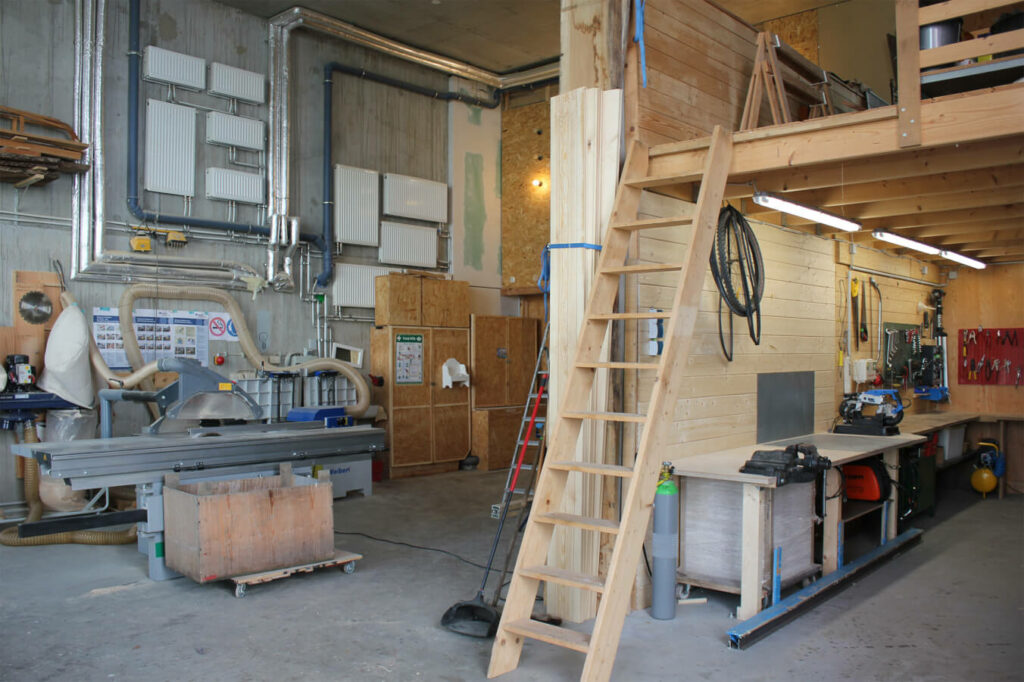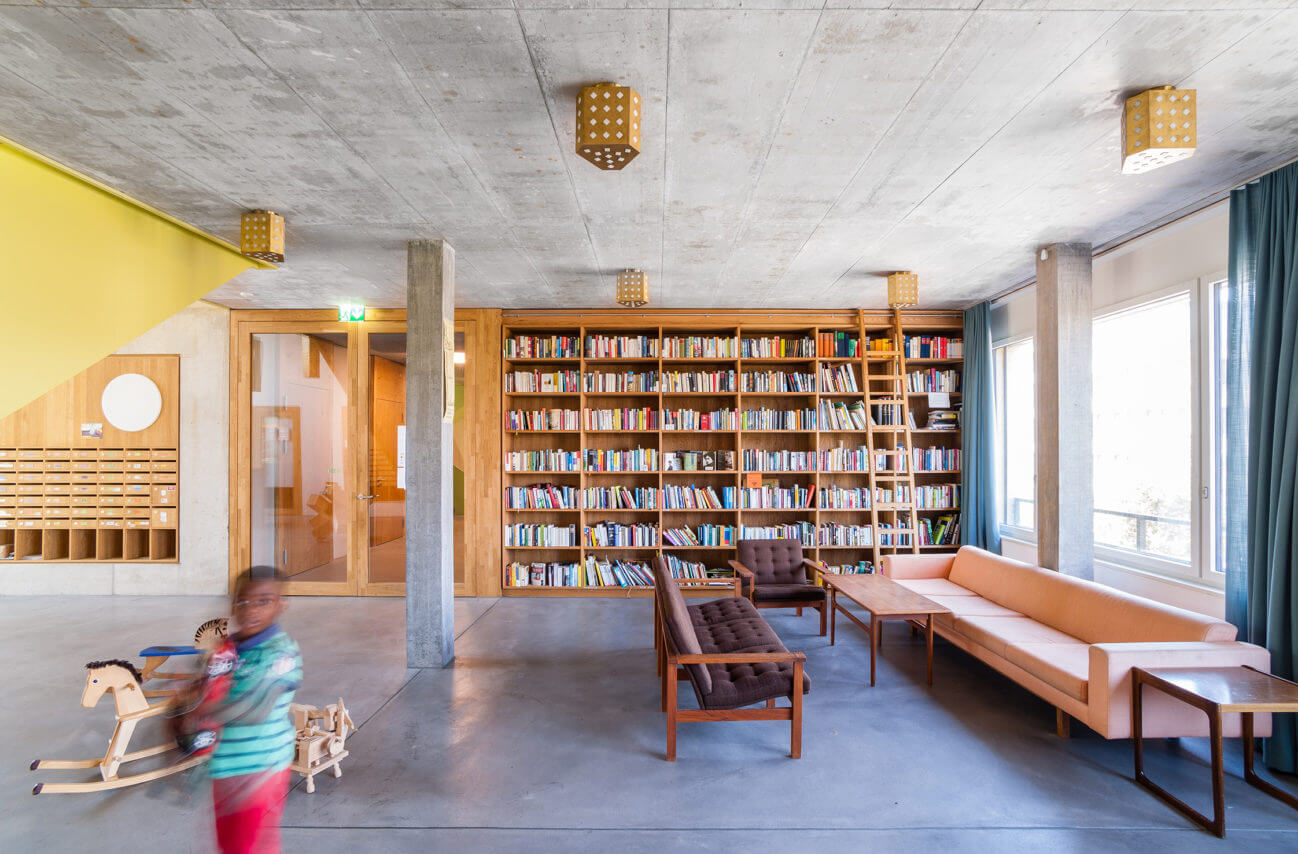Problem
Sharing opportunities are based on the principle of sharing instead of owning. Not only material objects such as tools or cargo bikes can be shared, but also spaces. How does sharing and collective use create accessibility for large and diverse user groups and at the same time save space and resources? What organisational requirements must be fulfilled so that the shared use of space and resources contributes to strengthening neighbourly relations? How do low-threshold provider concepts for sharing opportunities look like at the building or neighbourhood level?
Generic Description
Sharing opportunities can be implemented in many varieties. In addition to common spaces such as event and community rooms, washing and drying rooms and storage rooms, there are peer-to-peer offers such as swap and lending exchanges, also known as depots (Sinning et al. 2016, p.19). In these, food as well as household appliances and tools, books or clothes can be collected and independently used by the residents. Repair cafés or workshops function in a similar way, providing jointly usable tools and machines on site – optionally organised and accompanied by volunteers.
In addition to online-based sharing platforms for car or bike sharing, for example, there are also analogue “lending-board” that put communicative sharing in the foreground. They support neighbourly contacts through simple and effective means of communication: items for household or leisure can be borrowed from other residents (Hoffmann & Huber 2014, p. 50).
Sharing offers can be organised bottom-up by residents as well as initiated by housing companies.
Example
The ‘Konsumdepot’ in Heizenholz (cooperative: Kraftwerk1) is a self-service and self-supply depot in the basement of the project that is accessible to all residents and can be used independently (Bau-und Wohngenossenschaft Kraftwerk1 2012). In addition to vegetables, the depot provides other consumables. A self-organised group of building owners manages the ordering of goods and settles the accounts at the end of the month. The depot enables intensive use while promoting neighbourly contact (Hoffmann & Huber 2014, p. 49-50).
Projects such as Hunziker Areal, Stadterle and wagnisART have a communal laundry room, which reduces the total number of washing machines in the building and the space required for it. In addition, wagnisART has a climbing room in the basement that is accessible to all residents; the Stadterle and Heizenholz projects have a communal workshop.
Shared resources can also refer to intangible things such as time, work and skills. In the Giesserei project, all residents have to contribute 36 hours per year to the community project within the framework of the “Giesserei hours”, which can be activities such as management tasks, maintenance, repair, cleaning or care services.


Lessons learned and synergies
The financial and additional organisational effort required to establish sharing opportunities is a barrier (Sinning et al. 2016, p. 81). However, sharing services are an efficient instrument to support sustainable lifestyles and to enable affordability. When residents share equipment, spaces and resources, costs can be shared, expenses for higher quality can be made possible and resource consumption can be minimised. Sharing services also contribute to exchange among residents (Haller et al. 2017, p. 33), strengthen community ties and support networks. They also promote efficiency in terms of material and monetary resources and space through shared or multiple uses and higher utilisation.
Sources
Baugenossenschaft mehr als wohnen (n.y.): Das Zusammenleben mitgestalten.
Accessed on 03.03.2021 from https://www.mehralswohnen.ch/genossenschaft/mitwirken/
Bau- und Wohngenossenschaft Kraftwerk1 (2012): Kraftwerk1 Heizenholz.
Accessed on 18.01.2021 from https://www.kraftwerk1.ch/heizenholz/siedlung.html
Haller, A., Hofer, A., Laube, A., Schmid, P. & Wieland, A. (2017): Eine Vision wird real: 10 Jahre gesammelte Erfahrungen. Agnès Laube & Baugenossenschaft mehr als wohnen: Zürich.
Hoffmann & Huber (2014): Begleitstudie Kraftwerk1 Heizenholz. Genossenschaft Kraftwerk1: Zürich. Accessed on 22.02.2021 from https://www.age-stiftung.ch/fileadmin/user_upload/Projekte/2009/00028/2014_Age_I_2009_00028.pdf
Sinning, H., Baldin, M.-L., Löbe, L., Spars, G., & Heinze, M. (2016): Share Economy in der Wohnungswirtschaft: Ergebnisbericht Zur Online-Befragung 2016. Bundesministerium für Bildung und Forschung: Erfurt.
